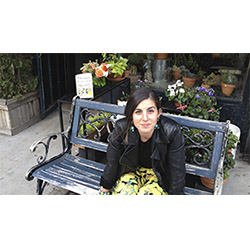'Work of beauty': Jessica Soffer '07 draws rave reviews for debut novel

Jessica Soffer’s ’07 debut novel, “Tomorrow There Will Be Apricots,” published earlier this year by Houghton Mifflin Harcourt, is being called “extraordinary” and “a work of beauty in words.”
Set in New York City, the story features a protagonist duo: a self-harming teenage girl who wants to attract her busy mother’s attention, and an octogenarian Iraqi-Jewish cooking instructor who is mourning her dead husband. The book fits snugly into the food-centric fiction genre, but it’s also a story of love, grief, family and acceptance.
The same New York Journal of Books reviewer who called the novel a work of beauty declares Soffer to be “a master artist painting the hidden hues of the human soul.” The Atlantic described the book as “beautifully written … moving, extraordinary.”
Soffer, 27, studied under Blanche Boyd, CC’s Weller Professor of English, writer-in-residence and mentor to many future novelists. Boyd was so impressed with the short story Soffer wrote for her honors thesis -- about a young woman at the beach with her dying father -- that she reads the piece to students every semester.
“Tomorrow There Will Be Apricots” grew out of a short story she wrote while in the graduate program at Hunter College, where she studied under author Colum McCann, a National Book Award winner. That story, “Pain,” chronicled a woman’s lifetime addiction to pain. The character was the seed for Lorca, the young protagonist of “Apricots” who cuts herself.
Soffer is open about the fact that she has never been a cutter herself, but she says she’s fascinated by addictions and the ways people find to cope with the world.
Writing in Time magazine, McCann picked “Apricots” as his favorite summer read of 2013, describing it as “a love song to both American and Iraqi culture, a sly political allegory and a homage to loneliness.”
The book’s title is from an Arabic phrase — Bukra fil mishmish — which, Soffer says, means, in essence, “Don't put off to tomorrow what you can do today,” as the apricot season is a very short and fickle one.
“And it means that good things might come tomorrow.”
Soffer, who taught creative writing at Connecticut College last fall, will embark on a 16-city promotional tour in October.
—Whit Richardson
September 18, 2013